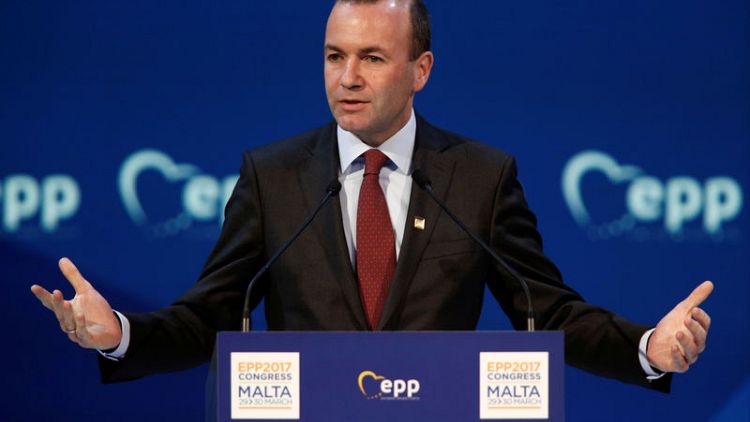By Alastair Macdonald
BRUSSELS (Reuters) - German conservative Manfred Weber declared his bid on Wednesday to succeed Jean-Claude Juncker as EU chief executive, signalling an early start to campaigning for elections to the European Parliament in May.
"I want to become the EPP's lead candidate for the 2019 European elections and be the next president of the European Commission," the 46-year-old tweeted during a meeting with members of his European People's Party (EPP) in Brussels.
Weber, who leads the biggest transnational group in the EU legislature, seems confident of backing from German Chancellor Angela Merkel, the bloc's main power broker.
But he will face big challenges, including from other conservatives, as well as resistance from French President Emmanuel Macron and others to the very system Weber wants to use to claim Brussels' top job.
Coming just after major power Britain leaves the bloc next March, and amid a rising volume of nationalist complaints against Brussels in other countries, the parliamentary vote will determine the political make-up of an important element in making laws applied across the continent.
The battle between nationalists and federalists, and then between national governments and the European Parliament over which has the major say in forming the executive Commission which proposes and implements EU policy, will also influence the extent to which Brussels increases or loses its central powers.
Weber, who lacks the senior governmental experience of past Commission presidents, has distanced himself from harder right leanings in his Bavarian Christian Social Union and is hoping for formal endorsement next week from Merkel and her Christian Democrats to take the EPP's lead at a convention in November.
He sees the EU as under threat from without, from the likes of unsympathetic foreign leaders such as U.S. President Donald Trump and Russian President Vladimir Putin, and from far-right and other eurosceptic forces gaining in polls across Europe.
"MORE EU DEMOCRACY"
"Europe is at a turning point," Weber said. "We are being challenged from the outside and the inside. It's about the survival of our European way of life."
He promised to revive popular engagement with the European Union and "more democracy" -- effectively increasing the role of the parliament he has served in for 14 years.
Bidding to increase its own power on the grounds it is more democratic, the European Parliament has sought to bind the 27 national leaders into nominating as Juncker's successor after the election one of the lead candidates from the handful or more of pan-EU party groups contesting the vote.
Macron and other leaders, arguing that they have stronger democratic mandates at home than a parliament whose existence and functions are unclear to many Europeans, insist that they will not be bound by the legislature's mechanism, known by the German for "lead candidate" as the Spitzenkandidat process.
The end of Mario Draghi's tenure as European Central Bank chief next year is another complicating factor, particularly for Merkel, who may have to trade off support for Weber against backing Bundesbank chief Jens Weidmann for the ECB job.
Weber could be anointed the EPP lead at a party convention on Nov. 8 but may face challengers, notably Michel Barnier, the French former minister running the Commission's Brexit talks, and former Finnish prime minister Alexander Stubb. Other parties plan to choose their lead candidates over the coming months.
After the election on May 26, the European Council of national leaders on June 20-21 would be expected to nominate a successor to take over from Juncker next November.
Leaders could defy Parliament and nominate someone who has not been elected as a lead candidate -- but that would risk the parliament voting down that nominee when it sits in September.
Parliamentary leaders say that the Commission president need not be the lead candidate of the biggest party -- which polls indicate could well be the EPP again -- but the lead candidate who can build a majority coalition of parties in the chamber.
(Reporting by Alastair Macdonald; Editing by Philip Blenkinsop and Catherine Evans)
